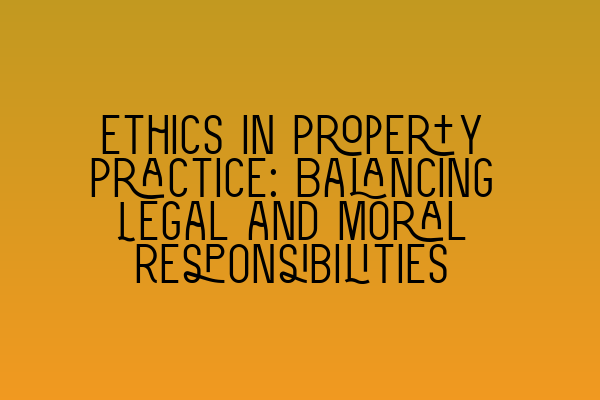Ethics in Property Practice: Balancing Legal and Moral Responsibilities
In the world of property law, practitioners are responsible for navigating complex legal frameworks while upholding ethical principles. The practice of property law involves the acquisition, management, and disposition of real estate, and it is essential for professionals in this field to find a delicate balance between their legal obligations and moral considerations.
At SQE Property Law & Land Law, we understand the importance of maintaining ethical standards in property practice and prioritize guiding our clients towards fair and just outcomes. In this blog post, we will explore the key aspects of ethics in property law and discuss the challenges faced in balancing legal and moral responsibilities.
1. Legal Obligations in Property Practice
Property law is entrenched in legislation, regulations, and legal precedents that shape its practice. As property practitioners, we are entrusted with enforcing and applying these laws to protect our clients’ interests. Conveyancing, leases, and property disputes are just a few areas where legal obligations come into play.
It is crucial for property law practitioners to stay updated with changes in legislation and remain knowledgeable about case law. This enables us to provide accurate advice and deliver effective solutions to our clients’ property-related issues.
As a solicitor, our duty is to serve our clients diligently, ensuring their legal rights and interests are upheld. However, there are often instances where legal obligations may conflict with moral considerations.
2. Moral Considerations in Property Practice
While property law is primarily concerned with legal aspects, it is essential for property practitioners to also consider the moral implications of their actions. Ethics play a vital role in ensuring fairness, justice, and equality in property transactions.
When engaging in property practice, we must always remember that we are dealing with people’s homes, businesses, and livelihoods, which often hold significant emotional value. Our decisions and actions can have a profound impact on individuals and communities. Therefore, it is crucial to approach property practice with a moral compass that prioritizes empathy, integrity, and respect for human rights.
Moral considerations in property practice can include issues such as fair access to housing, sustainable development, and the ethical treatment of tenants. Property practitioners must be mindful of these considerations and ensure they act in the best interest of their clients while upholding societal values.
3. Balancing Legal and Moral Responsibilities
As property law practitioners, balancing legal obligations and moral responsibilities can be challenging. It requires a deep understanding of the law, empathy towards clients, and a commitment to upholding ethical principles.
One way to achieve this balance is through open communication and collaboration with clients. By having honest and transparent discussions about the legal realities and the ethical implications of their choices, property practitioners can guide clients towards making informed decisions that align with their values and the law.
Moreover, keeping up to date with industry best practices and ethical guidelines is essential. Organizations such as the SRA (Solicitors Regulation Authority) provide codes of conduct and ethical standards that should inform and guide property practitioners in their daily practice.
Conclusion
Property practitioners face the ongoing challenge of balancing legal obligations with moral responsibilities. By integrating a deep understanding of the law, empathetic communication with clients, and a commitment to ethical principles, professionals can navigate this delicate balance successfully.
At SQE Property Law & Land Law, we recognize the importance of maintaining ethics in property practice. Our team of dedicated professionals is committed to providing high-quality legal services while upholding the values of fairness, justice, and integrity. Contact us to ensure your property matters are handled with skill, professionalism, and ethical considerations.
Related Articles:
